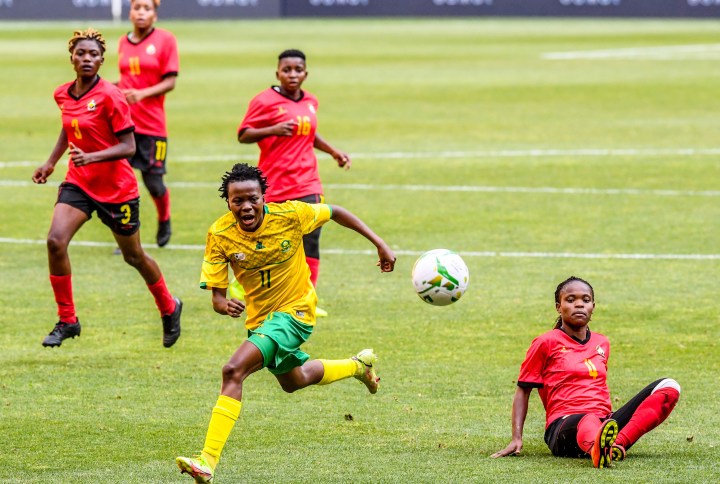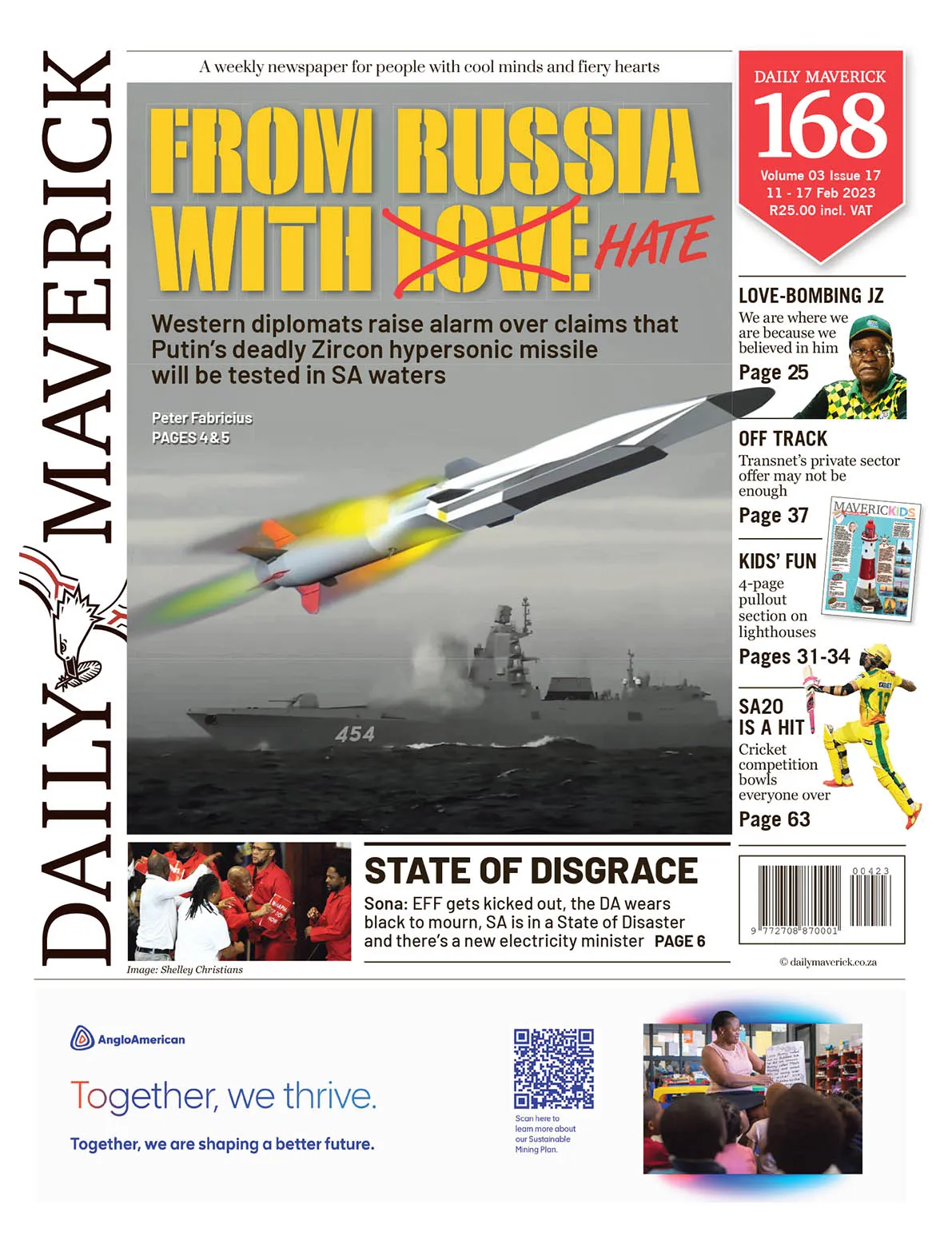LEVEL THE PLAYING FIELDS
It’s not just about the money, money, money, it’s about respect for women’s sport

For centuries, sport has been associated with manliness and machismo. It is taking a long time and much effort to dispel this bias.
Since their history-making Women’s Africa Cup of Nations (Wafcon) triumph in mid-2022, calls for Banyana Banyana to be paid as much as their male counterparts, Bafana Bafana, have grown.
As the team landed on South African soil to a raucous welcome from hundreds of fans at OR Tambo International Airport, Sports Minister Nathi Mthethwa announced discussions were taking place for the country’s female players to earn as much as the men.
That was in July 2022. At a recent media event at the South African Football Association (Safa) headquarters in Nasrec, chief executive Tebogo Motlanthe gave an update.
“We have started implementing the parity pay. For both Banyana and Bafana, the win bonus is the same. For both Banyana and Bafana, the daily allowances are the same. So, we have started it. We’re not just talking; we are walking the talk,” said Motlanthe.
With the sponsors Banyana’s Wafcon success attracted, parity seems to be around the corner. It’s not as simple as that, though, as equity is not supposed to be at national team level only.
Overall, female footballers in the country – much like female athletes globally – are decades, if not centuries, behind their male counterparts. It’s a long game of catch-up.
Men’s domestic soccer in South Africa has been around for decades in its current form, has a solid foundation, a decent following and multiple sponsors pumping in money.
By contrast, the national women’s league only took flight four years ago – with no official sponsor. Hollywoodbets stepped in as the headline sponsor after the first season.
Juggle jobs with playing
Players at DStv Premiership clubs make a living solely from the game. But, in the Super League, some female players juggle nine-to-five jobs with training and matches.
Their participation is mostly driven by a love of football, not financial gain and celebrity status. Otherwise, playing would be an inconvenience.
Thembi Kgatlana, one of the most recognised soccer players in the country, experienced the struggles of being a locally based female footballer before she landed international contracts and sponsorships.
She had this to say after Banyana’s Wafcon triumph: “The issue of money is not just with national teams. It has to start somewhere. The girls playing in the Hollywoodbets Super League – how many of them have contracts? You have to have a contract in order to be paid.
“A lot of these girls are discouraged. They have to choose between going to school and work or playing football.”
Visit Daily Maverick’s home page for more news, analysis and investigations
Her national team coach, Desiree Ellis, a founding member of Banyana Banyana, has hinted that her team would be better if players in the domestic league could focus on soccer as a career – like the males.
“We still have a lot of players [who] go to work; then, after work, they have to come train or play.
“Sometimes they can’t travel with their team on the weekend because they work from a certain time on a Saturday. Hopefully that will change in the not-so-distant future,” Ellis told DM168.
‘No one watches women’s sports’
The argument against male and female athletes earning the same has always centred on a lack of commercial appeal and public interest in women’s sports.
In the past, sport has generally been associated with masculinity, so indoctrination and mental conditioning has hindered, and continues to hinder, sports fans from gravitating towards women’s sports in general.
Thus, the argument that is used when the subject of equal pay arises in conversation – formal or informal – is that men’s sports are a lot more lucrative. It is an argument backed up by research.
“In most sports, there is less of a market for the women’s side of the game,” says researcher Laura Claus, a professor at University College London.
“For example, women’s soccer or women’s tennis. If you look at TV coverage, interest, ticket sales and other market indicators, most men’s sports will outperform women’s sports. On average and across sport, that’s a statistical fact.”
These facts cannot be disputed.
A case in point: the Springbok men’s side is what sustains SA Rugby financially.
But it is worth noting, again, that the women’s equivalent was only established in the early 2000s.
It would be unfair to expect them to generate as much income as a team that has been around for decades longer.
Fighting against stigma
This again falls back on the fact that, owing to the history and origins of sports, many people don’t look in the direction of women’s sport – or they even hold a sinister view of it.
From its beginnings in ancient Greece, the concept of sport was very much associated with manliness and machismo.
As for women, for centuries they have been expected to occupy themselves with activities that fitted their so-called marianismo qualities.
That was the general reality, until about the 20th century, when Europe and North America opened up opportunities for women to participate in competitive sport.
Even then, though, it was more of a façade, and female athletes generally were looked upon with disdain and constantly compared with male athletes.
This attitude still prevails in some circles in 2023.
One just has to look at the state of affairs in Afghanistan since the Taliban took over governance of the country in 2021. As well as barring females from being educated, the Islamic fundamentalist group banned their participation in sports.
Soon after the fundamentalists had taken over the country, Ahmadullah Wasiq, the deputy head of the Taliban’s cultural commission, told Australia’s SBS News it was “not necessary” for women to play sport.
“In cricket, they might face a situation where their face and body will not be covered. Islam does not allow women to be seen like this,” Wasiq said.
Such notions are still an important part of the psychology of some societies. Not only should women stay away from sports fields, they should not be waking up in the morning and going to work.
On the tennis court, particularly in Grand Slams, authorities have moved to ensure that the prize money for male and female athletes is equal.
Nevertheless, even in tennis, which leads the charge for pay parity among global sports, the gap is still wide in non-major tennis tournaments on the ATP and WTA tours.
All this considered, most female athletes in various codes are probably not too far from being remunerated at the same level as their male counterparts.
However, erasing the historical stigma towards women’s sports is a different proposition altogether. It may even be an impossible one in our lifetimes. DM168
This story first appeared in our weekly Daily Maverick 168 newspaper, which is available countrywide for R25.





















Comments - Please login in order to comment.